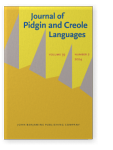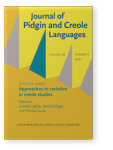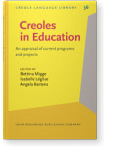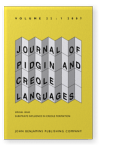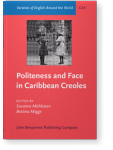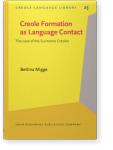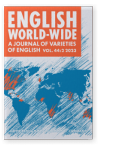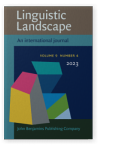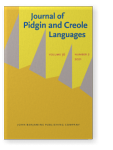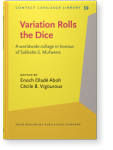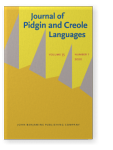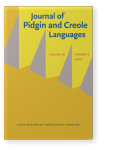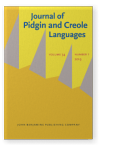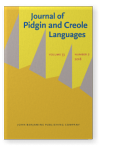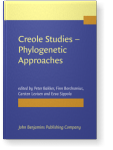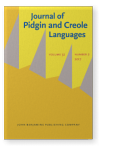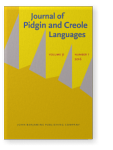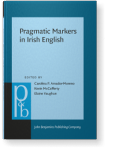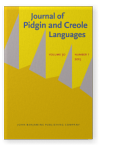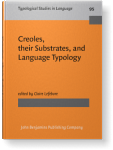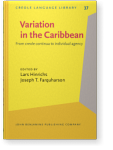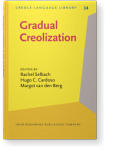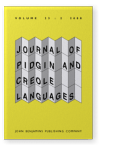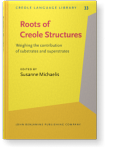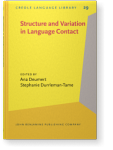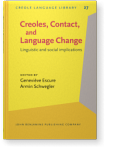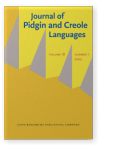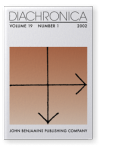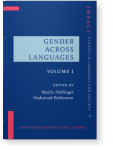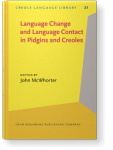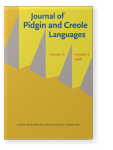Bettina Migge
List of John Benjamins publications for which Bettina Migge plays a role.
Journal
Approaches to Variation in Creole Studies
Edited by Isabelle Léglise, Bettina Migge and Nicolas Quint
Special issue of Journal of Pidgin and Creole Languages 36:1 (2021) v, 219 pp.
Subjects Contact Linguistics | Creole studies | Historical linguistics | Sociolinguistics and Dialectology
New Perspectives on Irish English
Edited by Bettina Migge and Máire Ní Chiosáin
[Varieties of English Around the World, G44] 2012. xvii, 361 pp.
Subjects English linguistics | Sociolinguistics and Dialectology | Theoretical linguistics
Creoles in Education: An appraisal of current programs and projects
Edited by Bettina Migge, Isabelle Léglise and Angela Bartens
[Creole Language Library, 36] 2010. vii, 356 pp.
Subjects Applied linguistics | Creole studies | Language teaching
Substrate Influence in Creole Formation
Edited by Bettina Migge and Norval Smith
Special issue of Journal of Pidgin and Creole Languages 22:1 (2007) 200 pp.
Subjects Creole studies | Historical linguistics | Sociolinguistics and Dialectology
Politeness and Face in Caribbean Creoles
Edited by Susanne Mühleisen and Bettina Migge
[Varieties of English Around the World, G34] 2005. viii, 293 pp.
Subjects Contact Linguistics | Creole studies | Discourse studies | Pragmatics | Sociolinguistics and Dialectology
Creole Formation as Language Contact: The case of the Suriname Creoles
Bettina Migge
[Creole Language Library, 25] 2003. xii, 151 pp.
Subjects Contact Linguistics | Creole studies | Historical linguistics | Sociolinguistics and Dialectology
2023 Review of Mühleisen (2022): Genre in World Englishes: Case Studies from the Caribbean English World-Wide 44:2, pp. 312–316 | Review
2023 Assessing the place of minoritized languages in postcolonial contexts using the Linguistic Landscape: The role of ethnographic information Linguistic Landscape 9:4, pp. 329–356 | Article
Linguistic Landscape research has demonstrated that detailed analysis of written signage provides, often simultaneously, important insights into various aspects of the sociolinguistic dynamics of a context, particularly those involving minoritized languages. Comparatively little of that research… read more
2021 Introduction Approaches to Variation in Creole Studies, Léglise, Isabelle, Bettina Migge and Nicolas Quint (eds.), pp. 1–11 | Introduction
2021 Linguistic research with language users: Opportunities and challenges Approaches to Variation in Creole Studies, Léglise, Isabelle, Bettina Migge and Nicolas Quint (eds.), pp. 201–219 | Miscellaneous
2021 Coordination in the Suriname Creoles: Comparing Nenge(e) and Matawai Variation Rolls the Dice: A worldwide collage in honour of Salikoko S. Mufwene, Aboh, Enoch O. and Cécile B. Vigouroux (eds.), pp. 161–189 | Chapter
Although there is a fair amount of research on the morphosyntax of the Suriname Creoles, coordination has received surprisingly little attention. Coordination can be seen as a fundamental aspect of grammar that intersects with a number of seemingly different constructions. Using quantitative and… read more
2020 Broadening creole studies: From grammar towards discourse Journal of Pidgin and Creole Languages 35:1, pp. 160–177 | Article
2020 Mediating Creoles: Language practices on a YouTube show Journal of Pidgin and Creole Languages 35:2, pp. 381–404 | Column
2019 A grammar of Saramaccan creole. By John McWhorter & Jeff Good Journal of Pidgin and Creole Languages 34:1, pp. 162–165 | Review
2017 Chapter 20. Epilogue: Of theories, typology and empirical data Creole Studies – Phylogenetic Approaches, Bakker, Peter, Finn Borchsenius, Carsten Levisen and Eeva M. Sippola (eds.), pp. 389–394 | Chapter
2017 Putting Matawai on the Surinamese linguistic map Journal of Pidgin and Creole Languages 32:2, pp. 233–262 | Article
The creoles associated with Suriname have figured prominently in research on creole languages. However, one variety, Matawai, has, to date, remained completely unresearched. This paper attempts to address this lacuna. It discusses its history and selected areas of grammar in order to assess the… read more
2015 Now in the speech of newcomers to Ireland Pragmatic Markers in Irish English, Amador-Moreno, Carolina P., Kevin McCafferty and Elaine Vaughan (eds.), pp. 390–407 | Article
Recently, people from all over the world have made Ireland their home. Their
reasons for coming to Ireland and their social and linguistic profiles are varied.
This study aims to investigate immigrants’ acquisition of pragmatic aspects of
Irish English, as these types of features tend to be highly… read more
2015 Assessing the sociolinguistic situation of the Maroon creoles Journal of Pidgin and Creole Languages 30:1, pp. 63–115 | Article
Recent anthropological and socio-historical research on Maroon populations suggests that Maroon communities have undergone significant social change since the 1960s spurred by processes of urbanization. However, to date very little is known about how these social changes are impacting on the Maroon… read more
2012 Irish English and recent immigrants to Ireland New Perspectives on Irish English, Migge, Bettina and Máire Ní Chiosáin (eds.), pp. 311–326 | Article
When Ireland became a country of net immigration in the 1990s, the varieties of English spoken on the island came to function as targets of language learning and were subjected to critical evaluation by people from a wide range of backgrounds. This paper explores newcomers’ views on and attitudes… read more
2012 Preface New Perspectives on Irish English, Migge, Bettina and Máire Ní Chiosáin (eds.), pp. xi–xvii | Preface
2011 Assessing the nature and role of substrate influence in the formation and development of the creoles of Suriname Creoles, their Substrates, and Language Typology, Lefebvre, Claire (ed.), pp. 155–179 | Article
Over the last 30 years or so, a significant amount of research has been carried out on the genesis and development of creoles. This research has shown that the creators of creoles’ first languages made an important contribution to creole grammars, but that their overall role in any specific case… read more
2011 On the emergence of new language varieties: The case of the Eastern Maroon Creole in French Guiana Variation in the Caribbean: From creole continua to individual agency, Hinrichs, Lars and Joseph T. Farquharson (eds.), pp. 207–230 | Article
Creoles are traditionally assumed to lack stylistic depth. Researchers recognize a basilectal variety and/or a mesolect, which is generally assumed to result from contact between the basilect and a European language. While the historical foundation of this model has been much called into question,… read more
2010 Integrating local languages and cultures into the education system of French Guiana: A discussion of current programs and initiatives Creoles in Education: An appraisal of current programs and projects, Migge, Bettina, Isabelle Léglise and Angela Bartens (eds.), pp. 107–132 | Article
In this paper we present and critically assess three programs that are currently running in French Guiana. They aim to integrate some local languages and cultures into the local education system that is otherwise identical to that of Metropolitan France. We discuss and compare their emergence,… read more
2010 Earlier Caribbean English and Creole in writing Varieties of English in Writing: The written word as linguistic evidence, Hickey, Raymond (ed.), pp. 223–244 | Article
In research on Creoles, historical written texts have in recent decades been fruitfully employed to shed light on the diachronic development of these languages and the nature of Creole genesis. They have so far been much less frequently used to derive social information about these communities and… read more
2010 Creoles in education: A discussion of pertinent issues Creoles in Education: An appraisal of current programs and projects, Migge, Bettina, Isabelle Léglise and Angela Bartens (eds.), pp. 1–30 | Article
This paper reviews and critically assesses issues that pertain to the implementation of Creole languages in education. We review historical, social and political issues that have hindered the introduction of most of these contact languages in the educational domain as well as the factors that have… read more
2009 The origin and development of possibility in the creoles of Suriname Gradual Creolization: Studies celebrating Jacques Arends, Selbach, Rachel, Hugo C. Cardoso and Margot van den Berg (eds.), pp. 129–153 | Article
In this paper we discuss the origin and development of the expression of possibility in the creoles of Suriname. We first describe the systems of possibility in Sranan and three Maroon creoles (Ndyuka, Pamaka, and Saamaka), drawing on data elicited from informants, conversational data, as well as… read more
2008 13. Between contact and internal development: Towards a multi-layered explanation for the development of the TMA system in the creoles of Suriname Roots of Creole Structures: Weighing the contribution of substrates and superstrates, Michaelis, Susanne Maria (ed.), pp. 301–331 | Article
This paper proposes a new analysis of the formation of the tense-mood-aspect (TMA) system of the Surinamese Maroon creoles based on a wide range of both contemporary and historical sources. The paper first provides a brief synopsis of the socio-historical context in which the creoles of Suriname… read more
2007 Introduction: Substrate influence in creole formation Substrate Influence in Creole Formation, Migge, Bettina and Norval Smith (eds.), pp. 1–15 | Article
2007 Substrate influence on the emergence of the TMA systems of the Surinamese creoles Substrate Influence in Creole Formation, Migge, Bettina and Norval Smith (eds.), pp. 73–99 | Article
Although the Surinamese Creoles have figured prominently in discussions about Creole genesis, little is still known about the origin of their TMA system, a central area of grammar that has received much attention in this debate. In this paper we assess the relative contribution of the primary… read more
2006 Tracing the origin of modality in the creoles of Suriname Structure and Variation in Language Contact, Deumert, Ana and Stephanie Durrleman (eds.), pp. 29–59 | Chapter
Creole TMA systems have figured prominently in debates on creole genesis. Bickerton argued that the similarities between creole TMA systems support the operation of a language bioprogram in creole formation. Lefebvre maintains that the similarities between the Haitian and Fongbe TMA system are… read more
2005 Greeting and social change Politeness and Face in Caribbean Creoles, Mühleisen, Susanne and Bettina Migge (eds.), pp. 121–144 | Article
2005 Politeness and face in Caribbean Creoles: An overview Politeness and Face in Caribbean Creoles, Mühleisen, Susanne and Bettina Migge (eds.), pp. 1–19 | Miscellaneous
2004 13. The speech event kuutu in the Eastern Maroon community Creoles, Contact, and Language Change: Linguistic and social implications, Escure, Geneviève and Armin Schwegler (eds.), pp. 285–306 | Chapter
2002 The origin of the copulas (d/n)a and de in the Eastern Maroon Creole Diachronica 19:1, pp. 81–133 | Article
Summary It is generally assumed that the copulas (d/n)a and de in the creoles of Suriname emerged due to processes of reanalysis and grammaticalization from that and there, respectively. While Arends (1989) argued that these processes were triggered and guided by substrate influence, McWhorter… read more
2001 Eastern Maroon Creole. Communicating gender in the Eastern Maroon Creole of Suriname Gender Across Languages: The linguistic representation of women and men, Hellinger, Marlis and Hadumod Bußmann (eds.), pp. 85–104 | Article
1.Introduction
2. Gender in the Eastern Maroon Creole (EMC)
2.1 Personal nouns with lexical gender: Kinship terms
2.2 Address forms
2.3 Formation of gender-marked personal nouns from non-personal words
2.4. Formation of gender-marked nouns from personal nouns
3. The… read more
2000 The Origin of the Syntax and Semantics of Property Items in the Surinamese Plantation Creole Language Change and Language Contact in Pidgins and Creoles, McWhorter, John H. (ed.), pp. 201–234 | Article
